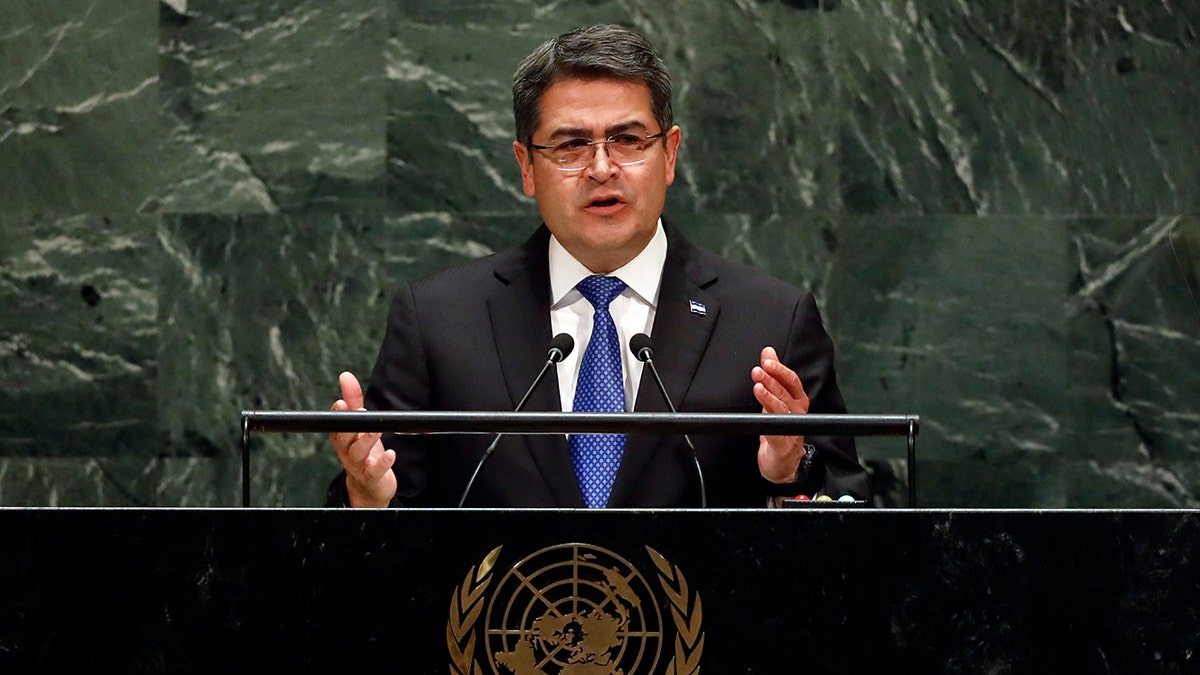Fox News Flash top headlines for Sept. 25
Fox News Flash top headlines for Sept. 25 are here. Check out what's clicking on Foxnews.com
The Trump administration announced Wednesday that it had signed an agreement with Honduras that effectively prevents migrants from traveling through Central America to enter the United States.
The deal, signed on the sidelines of the United Nations General Assembly in New York, completes a central component of President Trump’s strategy to deter asylum-seekers from crossing into the U.S. through Mexico. A similar arrangement was signed with El Salvador last week; a more comprehensive agreement was previously sealed with Guatemala. Most families arrested or stopped at the U.S.-Mexico border are from those three countries, known as the Northern Triangle.
TRUMP SLAMS OPEN-BORDER ACTIVISTS FOR 'EVIL' AGENDA, DECRIES 'BLOODLUST' IN FIERY UN SPEECH
Trump told reporters that the agreements, coupled with a crackdown by Mexico following tariff threats by his administration, "will make a tremendous difference in our southern border." During a meeting with El Salvador's president, Nayib Bukele, on the sidelines of the General Assembly, Trump said the agreements were "good for all of us."
The details of the Honduran agreement have not been released and much remains unclear, including when it would take effect. Trump met Wednesday with Honduran President Juan Orlando Hernández in New York. The meeting was not open to the press.

Honduras President Juan Orlando Hernandez Alvarado addresses the United Nations General Assembly Wednesday. (AP Photo/Richard Drew)
A joint statement Wednesday said the U.S. and Honduras would develop best practices "to increase protection options for vulnerable populations." It also said, "coordination and collaboration between the governments of the United States and Honduras has increased to new, unprecedented levels."
While migrants would not be returned to their home countries, they would be sent to other countries they passed through. For example, Hondurans must travel through Guatemala to reach the U.S. by land. The agreement would likely have its biggest direct impact on people of other nationalities, including many from Cuba and Africa, who fly to countries south of the Northern Triangle and travel by bus to the United States, most commonly through Honduras and Guatemala.
U.S. immigration officials said in March that the U.S. border had reached a breaking point, with tens of thousands of migrant families crossing. That had led to massive overcrowding and reports of fetid and filthy conditions and prolonged detention at U.S. border facilities not meant to hold people more than a few days. It’s unclear whether the numbers will rise again as the desert weather cools.
In other efforts to tighten immigration restrictions, the Trump administration has made more than 42,000 people, largely Central Americans, wait in Mexico and cross the border for hearings in U.S. immigration court. Meanwhile, the U.S. Supreme Court this month cleared the way for the administration to deny asylum to anyone who traveled through another country to reach the border.

President Donald Trump meets with President Nayib Bukele of El Salvador Wednesday on the sidelines of the U.N. General Assembly. (AP Photo/Evan Vucci)
The asylum ban has taken effect in tandem with U.S. efforts to help impoverished, dangerous and corrupt Central American countries absorb large numbers of people seeking refuge there. The State Department acknowledged the poor conditions in Honduras in a 2018 human rights report.
“Organized criminal elements, including local and transnational gangs and narcotics traffickers, were significant perpetrators of violent crimes and committed acts of homicide, extortion, kidnapping, torture, human trafficking, intimidation, and other threats and violence directed against human rights defenders, judicial authorities, lawyers, the business community, journalists, bloggers, women, and members of vulnerable populations,” the report said.
CLICK HERE TO GET THE FOX NEWS APP
It said that there were reports “arbitrary and unlawful killings,” complaints of torture, arbitrary arrests and detentions and “harsh and life-threatening prison conditions.”
The Trump administration also struck a pact with Mexico in June giving the border nation 90 days to reduce the flow of migrants from Central America to the U.S., or else a tariff on Mexican goods in the U.S. would be imposed. In September, the Mexican government announced a 56 percent drop over three months in migrants arriving at the U.S.-Mexico border.
In a nod to the absence of a robust network to absorb refugees, acting Homeland Security Secretary Kevin McAleenan on Monday announced $47 million in aid for Guatemala to build its asylum system. It remains unclear what assistance El Salvador and Honduras may get.
The Associated Press contributed to this report.













































